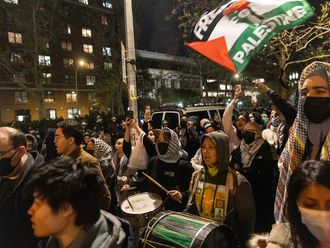Russian-Iranian relations are going through a difficult period due to the numerous problems plaguing Tehran. Ties began to deteriorate when Russia changed its stance on Iran's nuclear programme in September, 2009.
This was when Russian President Dmitry Medvedev gave the first hint that Russia was prepared to perform a significant policy U-turn and support the US push for sanctions against Iran.
This change of heart came after reports that Iran was secretly setting up an uranium enrichment plant in the city of Qom, without having alerted the International Atomic Energy Agency (IAEA).
Tehran's announcement in February that it had started enriching uranium to 20 per cent was the straw that broke the camel's back.
Russia consequently made the transition from a position of uncertainty with regards to Iran's intentions to siding with the US and its western allies, who were calling for a fourth round of sanctions against Iran.
As a consequence, Moscow decided to halt the delivery of powerful S-300 air-defence missiles to Iran, citing the new UN sanctions on the Islamic Republic. Russia also alerted its political, diplomatic and military divisions of its new stance regarding Iran, thereby doubling the pressure on Tehran to abandon its controversial nuclear programme.
Iran responded by accusing Russia of succumbing to US and Israeli pressure and cancelled a visit by its chief nuclear negotiator, Saeed Jalili, Secretary of the Supreme National Security Council, to Moscow, which was scheduled to take place in January.
Iran also decided to lay off a number of Russian pilots and crew who worked for the country's commercial airlines, giving them two months' notice.
Jumping to conclusions
Many commentators played down the political spat, suggesting that it would not last long because the two countries have long enjoyed good relations and share a common agenda in attempting to limit the influence and dominance of the US.
However, this optimistic view soon proved inaccurate and commentators had to re-evaluate their assessments after Medvedev said on July 12 that Iran was getting closer to acquiring nuclear weapons.
"We have to get away from short-cut approaches to this issue," Medvedev said in a meeting with ambassadors in Moscow.
Over the years, Russia has sat on the fence, somewhere between the international community's opposition to Iran's nuclear programme and Iran's insistence on developing its nuclear capabilities, despite the IAEA's suggestions that the nuclear programme may not be entirely peaceful.
Problem of proximity
However, a nuclear-capable Iran is more of a concern for Russia than for the US or West European countries due to geography. Russia is not keen on having a nuclear neighbour just a stone's throw from its southern border, as this would place an added burden on its military.
Relations between Russia and Iran date back to the 16th century, when the Safavid Dynasty was established in Iran. Ties have fluctuated between being stable and tense. Russia and Iran also have long-standing economic and social bonds. The relationship between the two countries improved after the downfall of the Safavids and the emergence of the Qajar Dynasty in the mid-18th century, because the latter were less keen on promoting a sectarian ideology in neighbouring countries.
Since the end of the Soviet Union, Moscow has been displeased with Iran's interference in Russia and in Central Asia's Islamic republics.
After the fall of the Soviet Union, there was a security vacuum in the new republics that emerged, giving Iran the opportunity to propagate its ideologies among 20 million Muslims who live mostly around the Volga and the Caucasus. Another five million Muslims live between the borders of China and Japan to the east, and Finland's border to the west, including the Azaris who live in Moscow.
A quick review of the 40 years since the IAEA was established shows that the international community was not successful in preventing Israel, India, Pakistan and North Korea from acquiring nuclear weapons. Though it is unproven and hotly debated, Iraq may have been the only country that had a nuclear programme but was prevented from materialising.
Given this history, it is apparent that neither political nor military measures will necessarily prevent Iran from acquiring nuclear weapons.
Russia will find itself in a critical position if Iran succeeds in obtaining nuclear weapons. This would cause Russian-Iranian relations to hit rock bottom.
Dr Mohammad Akef Jamal is an Iraqi writer based in Dubai.











